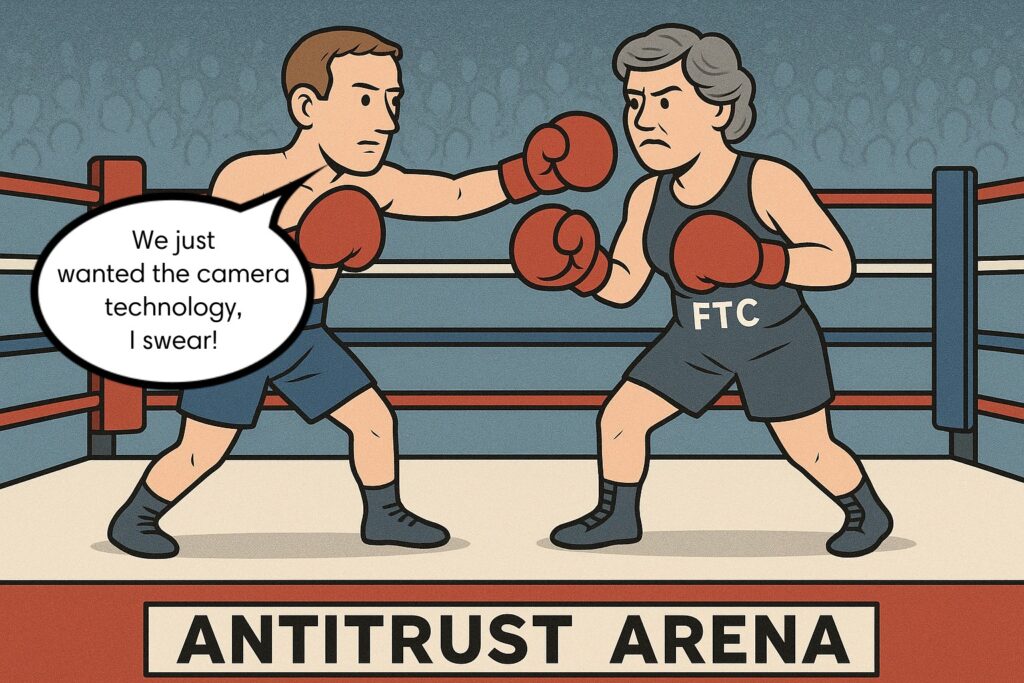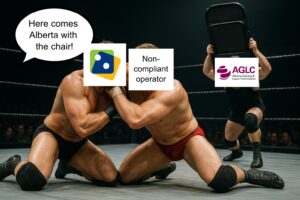In this week’s edition of the GME3, we’re taking a look at the debate over the Alberta iGaming Corporation Act in the provincial assembly, the announcement that Nvidia plans to invest up to $500 billion in U.S.-based artificial intelligence infrastructure over the next four years, and Mark Zuckerberg’s testimony in Meta’s high-profile antitrust trial. Read the full stories below!
Gambling
Wild Rose & Wild Rules
Debate over Alberta’s proposed iGaming legislation began in the provincial Assembly on April 10, as lawmakers discussed Bill 48, the Alberta iGaming Corporation Act. Introduced by Minister Dale Nally, the bill aims to regulate online gambling through a new conduct-and-manage entity modelled on iGaming Ontario, with Alberta Gaming, Liquor and Cannabis (AGLC) continuing as the regulator and operator of the Play Alberta platform.
Nally emphasized that the bill’s intent is not to encourage gambling, but to bring existing unregulated activity under government oversight. He cited concerns over the risks posed by gray market operators, with over half of Alberta’s players using unregulated sites. The bill proposes safeguards, including a centralized self-exclusion system, and emphasizes harm reduction and responsible gambling.
Supporters in the United Conservative Party (UCP) highlighted the potential for consumer protection, economic benefits, and better oversight of online operators already serving Albertans. They also noted that key policies on revenue sharing and social responsibility would be developed later in consultation with Indigenous groups and industry stakeholders.
However, members of the opposition New Democratic Party (NDP) criticized the lack of concrete details in the bill. They raised concerns over the absence of clear plans for revenue distribution, enforcement, and advertising rules. MP Gurinder Brar called it a “blank cheque,” while MP Peggy Wright warned that delayed regulations pose risks. Debate on the bill will continue at a later date.
Media
America Chips In
Nvidia has announced plans to invest up to $500 billion in U.S.-based artificial intelligence infrastructure over the next four years, marking a major shift toward domestic manufacturing amid rising tariff threats from President Donald Trump. The chipmaker, whose processors power much of today’s AI development, will work with partners including TSMC, Foxconn, and Wistron to design and build supercomputing facilities and chip production plants across the U.S.
The move follows Trump’s recent threats to impose tariffs on semiconductors, many of which Nvidia currently has manufactured in Taiwan. Nvidia CEO Jensen Huang recently met with Trump at Mar-a-Lago, and the White House described the company’s investment as “the Trump Effect in action.” Production of Nvidia’s Blackwell GPUs has already begun at TSMC’s plant in Arizona, with new facilities underway in Houston and Dallas.
Huang said expanding U.S. manufacturing will help Nvidia meet soaring demand for AI chips, while also strengthening the supply chain and ensuring resilience against geopolitical risks. While Nvidia’s stock has soared more than 1,000% since 2020, tariff uncertainty has led to a recent 20% drop in its valuation.
The announcement comes as the U.S. considers further tariffs on semiconductors and pharmaceuticals. Although current tariffs exclude these sectors, Trump has indicated new levies are imminent. The Department of Commerce has launched a national security review of these imports.
Nvidia’s investment aligns with broader efforts to onshore critical technologies. The Biden administration previously passed the Chips Act in 2022 to incentivize domestic chipmaking. Meanwhile, pharmaceutical companies like Novartis have also unveiled multi-billion-dollar U.S. expansion plans to mitigate tariff risks.
Entertainment
Zucker-Punch
Meta CEO Mark Zuckerberg has taken the stand in a high-profile antitrust trial that could force the breakup of his company. The U.S. Federal Trade Commission (FTC) accuses Meta of maintaining a monopoly in social media by acquiring emerging rivals Instagram in 2012 and WhatsApp in 2014, effectively neutralizing competition. The FTC seeks to unwind these acquisitions, arguing they were defensive moves designed to eliminate threats rather than improve user experience.
During his testimony, Zuckerberg defended the purchases, claiming they were meant to enhance Meta’s offerings and that there remains strong competition in the market from TikTok, YouTube, and others. He downplayed internal emails suggesting Meta feared falling behind Instagram, stating those were early-stage discussions. He also argued that Instagram was acquired primarily for its camera technology.
FTC lawyers presented those internal communications as key evidence, including a 2012 memo referencing the need to “neutralize” Instagram. They argue Meta overpaid for both apps to stifle competition and now unfairly dominates a sector with 3.27 billion daily users. Meta counters that the acquisitions were legally approved and have benefited consumers.
The trial, expected to last through July, coincides with broader antitrust scrutiny of U.S. tech giants. Legal experts suggest the FTC faces a tough case given the more fragmented nature of the social media landscape compared to other monopolies like Google’s search dominance.
GME Law is Jack Tadman, Zack Pearlstein, Lindsay Anderson, Daniel Trujillo, and Will Sarwer-Foner Androsoff. Jack’s practice has focused exclusively on gaming law since he was an articling student in 2010, acting for the usual players in the gaming and quasi-gaming space. Zack joined Jack in September 2022. In addition to collaborating with Jack, and with a keen interest in privacy law, Zack brings a practice focused on issues unique to social media, influencer marketing, and video gaming. Lindsay is the most recent addition to the team, bringing her experience as a negotiator and contracts attorney, specializing in commercial technology, SaaS services, and data privacy.
At our firm, we are enthusiastic about aiding players in the gaming space, including sports leagues, media companies, advertisers, and more. Our specialized knowledge in these industries allows us to provide tailored solutions to our clients’ unique legal needs. Reach out to us HERE or contact Jack directly at jack@gmelawyers.com if you want to learn more!
Check out some of our previous editions of the GME3 HERE and HERE, and be sure to follow us on LinkedIn to be notified of new posts, keep up to date with industry news, and more!




